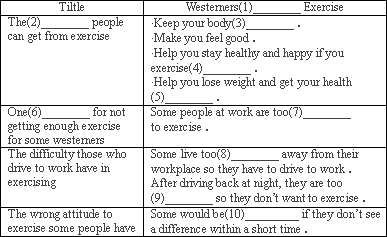题目内容
任务型读写
AIDS is a medical condition caused by HIV, a virus which damages people's natural defenses against disease.So far, no cure has been found for it.
In the early mid-1980s, while other parts of the world were beginning to deal with the serious disease, Asia remained relatively unaffected by this newly discovered health problem.By the early 1990s, however, HIV and AIDS had hit several Asian countries, and by the end of that decade, HIV was spreading rapidly in many areas of the continent.Today, HIV and AIDS are a growing problem in every region of Asia.The latest statistics produced by UNAIDS suggest that in 2008, over 5 million people were living with HIV or AIDS in Asia.
Various factors cause the spread of HIV, including poverty, inequality, unequal status of women, cultural myths about sex and high levels of migration(移民).Although it's useful to understand the situation of AIDS in Asia as a whole, each country in the region faces a different situation.In Cambodia and Thailand, there has been evidence of declines in HIV infection levels.In Indonesia, Pakistan and Vietnam, meanwhile, the number of people living with HIV has rapidly increased.In China, the number of people newly infected with HIV and AIDS is also rising, although at a much slower pace.
Much improvement is needed to prevent HIV and AIDS around Asia.New guidelines and policy documents have been continually issued over the years.Most of the successful programs do have at least three features in common.Firstly, these programs encourage HIV and AIDS education among the general population to teach people how to avoid infection and to face discrimination.Secondly, they are very practical and they involve the infected people themselves in program design and implementation(实施).Last but not least, strong leadership is essential for HIV prevention.If all of the leaders truly committed themselves to this cause, then a great many lives would be saved.

解析:
|
(1)cause (2)damaging (3)relatively (4)hit (5)present/current (6)with (7)different (8)features (9)Encouraging (10)involved |

 阅读快车系列答案
阅读快车系列答案任务型读写(共10小题;每小题1分,满分10分)
阅读下面短文,根据所读内容在表格中的空白处填入恰当的单词。注意:每个空格只填一个单词。
People unhappy with the rich: Poll
There is growing dissatisfaction toward rich people, according to a new online poll.
The poll by the China Youth Daily in collaboration(与…合作) with Sina.com has highlighted the apparent discontent (不满)over the country's widening income gap.
Nearly 8,000 people filled in online questionnaires last week, and when asked to use three words to describe society's rich, the top responses were "extravagant"(奢侈的), "greedy" and "corrupt".
About 57 percent of those polled said that "extravagant" was the best word to describe the rich, followed closely by "greedy".
Ironically, despite their dissatisfaction, 93 percent of those polled wished they could be rich too, and that richer people should be "socially responsible".
Some 33 percent of respondents also praised rich people for being "smart".
Nearly 90 percent of respondents agreed that most people in society, including themselves, were willing to speak up for the poor but were reluctant to take action and actually do something for them.
The survey comes on the heels of a heated debate over comments made by renowned economist Mao Yushi, who said he was "speaking for the rich and working for the poor".
A report released by the Asian Development Bank last Wednesday revealed that China's Gini coefficient - an indicator of the wealth divide - rose from 0.407 in 1993 to 0.473 in 2004.
An earlier CASS report said that the richest 10 percent of Chinese families now own more than 40 percent of all private assets, while the poorest 10 percent share less than 2 percent of the total wealth.
The country's income disparity(悬殊) is close to that of Latin America, the report which came out in January said.
|
Theme |
People unhappy with the rich |
|
The poll by China Daily |
1. Nearly 8,000 people filled in __1.__ on the ___2.___last week. 2. There is an __3.__ dissatisfaction tendency toward rich people. 3. Ironically, in __4._ of their dissatisfaction, 93 percent of the polled wished they could be rich too, and rich people should take “__5._ responsibility”. 4. ___6.__ ,Mao Yushi, said he was “speaking for the rich and working for the poor.” |
|
A report ___7.__ by the Asian Development Bank |
1. The richest 10 percent of Chinese families now on more than 40 percent of all _8.__ assets, while the poorest 10 percent ___9._ for less than 2 percent of the total wealth. 2. The country’s income disparity is close to that of Latin America, according to the report which came out in ___10._. |


